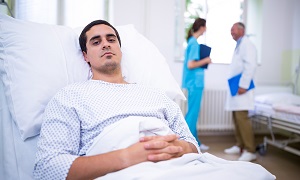Best Doctors in India for Vagus Nerve Stimulation
Best Hospitals in India for Vagus Nerve Stimulation
Hospital Highlights:
- Apollo Hospitals is a private healthcare group in India, with its headquarters based in Chennai. Established in 1983 by Dr. Prathap C. Reddy, the group offers a wide range of medical treatments and services across various specialties.
- It is renowned for emphasizing innovation and utilizing cutting-edge medical technologies into patient treatment.
- Known as India’s first corporate hospital, Apollo Hospitals is often credited for pioneering the private healthcare revolution in the country.
- With clinics and hospitals located all throughout India, Apollo Hospitals is a nationwide healthcare organization. Its presence can also be found in foreign countries.
- Preventive health examinations, medical and surgical treatment, and diagnostic centres are just a few of the services that the Apollo group provides.
- The group has several centres of expertise, including Cardiac Sciences, Neurosciences, Orthopedics, Emergency Care, Cancer Care, and Organ Transplantation.
- City: Chennai, India
Hospital Highlights:
- RIMC is a multi-specialty hospital in a sprawling area of 36 acres located in Chromepet, Chennai, Tamil Nadu, India.
- The facility has 450 beds including 130 critical care beds, 9 operating rooms, modern reference laboratories and radiology services, and is conveniently located near road, rail and air transportation.
- RIMC is led and managed by world-renowned physicians committed to healthcare.
- RIMC offers the broadest range of clinical care, education, and research. The hospital offers state-of-the-art technology and modern treatment facilities designed to provide health care at an affordable cost.
- Rela Institute is driven by patient needs, comfort and confidence.
- City: New Delhi, India
Hospital Highlights:
- Fortis Hospital in Shalimar Bagh is a multi-super specialty hospital that strives to provide world-class patient care by leaving no stone unturned.
- Fortis, Shalimar Bagh, with 262 beds and a 7.34-acre footprint, provides the best level of medical care through its team of doctors, nurses, technicians, and management professionals.
- City: Bengaluru, India
Hospital Highlights:
- Established in 2007, the Apollo Hospitals Bangalore is a 300-bed multispecialty hospital situated in Bannerghatta Road, Bangalore.
- Equipped with the state-of-the-art technology, it is a leading hospital dedicated to providing healthcare needs to patients with compassion and expertise.
- It is the first hospital to have completed the highest number of Robot Assisted Heart Surgeries in India.
- Over the years, it has successfully conducted some of the rarest medical procedures such as spinal angiolipoma excision, autologous chondrocyte implantations, and tibial tuberosity shift with MPSL reconstruction.
- The Apollo Hospitals Bangalore has the reputation of performing the greatest series of airway stents in the country.
- Additionally, the hospital is known for providing comprehensive treatment in specialties such as gastroenterology, urology, gynecology, oncology, colorectal surgery, etc.
- The “The Minimal Access Surgery Centre” (MASC), one of Apollo Hospitals, Bangalore’s premier Centres of Excellence, is devoted to the use of minimally invasive surgical procedures.
- In 2013, THE WEEK-A C Nielsen, Best Hospital Survey ranked Apollo Hospitals Bangalore as the 2nd best multi-speciality hospital in Bangalore.
- City: Mumbai, India
Hospital Highlights:
- Gleneagles Global Hospital The 450-bed facility comprises of 17-stories, housing state-of-the-art infrastructure, and advanced medical care facilities.
- The hospital offers end-to-end clinical, surgical, and diagnostic services. It is equipped with a team of eminent medical professionals aided by qualified nurses and medical staff
- The Hospital offers advanced Endoscopic procedures, Hepatobiliary and Liver Surgeries, Surgical and Medical Gastroenterology, Bariatric Surgery, and Robotic surgery.
- The hospital is a center of excellence for Orthopedics, Joint Replacement, Knee Replacement, and Hip Replacement surgery.
- City: Hyderabad, India
Hospital Highlights:
- CARE Hospitals were established in the year 2000, by CARE Group.
- The multispecialty hospital has 435 beds, including 120 critical care beds, with an annual inflow of 180000 outpatients and 16,000 in-patients.
- The hospital provides specialty medical services in Cardiology, Cardiothoracic Surgery, Pediatric Cardiology, Pediatric Cardiothoracic Surgery, Neurology, Neurosurgery, Nephrology, and Urology.
- The hospital has the first dual source, 128 slice CT scanner (for high precision cardiac imaging) – the first of its kind in south India.
- The hospital offers a wide range of accommodation facilities for the convenience of its varied patient base, ranging from general wards to super deluxe rooms.
- City: Mumbai, India
Hospital Highlights:
- Fortis Hospital in Mulund is a 315-bed multi-speciality tertiary care hospital with five JCI accreditations that offers a wide variety of diagnostic and treatment services. The Fortis Hospital in Mulund delivers patient-centred treatment with cutting-edge technology, highly skilled and experienced surgeons, and paramedical staff.
- This institution houses Maharashtra’s largest multi-organ transplant centre. It is also the first heart transplant centre in western India to conduct 100 or more consecutive heart transplants in under four years. It is the only hospital in the city to have multi-organ transplants and has handled the youngest patient for angioplasty. Fortis Hospital Mulund now boasts the first advanced surgical robot in central Mumbai.
- Cardiology and heart surgery, urology, nephrology, neurosciences, orthopaedics, digestive care, emergency and critical care, and maternity care are among the services provided by the hospital.
- City: New Delhi, India
Hospital Highlights:
- Manipal Hospitals, Dwarka, is a super-specialty hospital in Dwarka, New Delhi, which is a part of Manipal Hospitals Group.
- The hospital aims to provide the best treatment on par with international standards at a fraction of the cost.
- Equipped with 380 beds, the hospital is also one of the new age hospitals which are equipped fully with state-of-the-art infrastructure, cutting-edge technology as well as the latest and advanced clinical practices. The hospital also has 13 modular Operation theatres with 118 beds which are solely meant for critical care.
- The hospital comprises internationally acclaimed doctors and highly professional and experienced hospital and medical staff who are able to provide preventive, therapeutic, and diagnostic services all under one roof.
- City: Chennai, India
Hospital Highlights:
- Located in Chennai, India, MGM Healthcare is a top multispecialty hospital that provides all medical services under one roof.
- Since its founding in 2019, MGM Healthcare has quickly become a leading national referral centre, creating several innovative flagship initiatives.
- MGM Healthcare combines next-generation medical and digital technologies to provide better patient results.
- With 12 centres of excellence, more than 400 inpatient beds, 100 intensive care unit beds, and 24/7 emergency care, MGM Healthcare leaves no chance in redefining the patient experience in Chennai.
- MGM Healthcare boasts 250+ expert doctors across 30+ departments, including Cardiology, Pulmonology, Neurology, Obstetrics & Gynaecology, and more.
- They house 12 specialized Centres of Excellence, including Neurosciences, Orthopaedics, and Multi-Organ Transplantation.
- Their team of doctors, nurses, and paramedics works together to give every patient individualized treatment.
Hospital Highlights:
- Lilavati Hospital & Research Centre is India’s premier multi-speciality tertiary care hospital and has been recognised as a global medical excellence centre.
- Lilavati Hospital & Research Centre has built an unrivalled level of trust with its patients over the years, thanks to a solid foundation that comprises cutting-edge facilities, the best medical competence, research, education, and charity endeavours.
- The hospital is quite proud of the fact that it now serves patients from all kinds of backgrounds, not just from the United States but from all around the world.
- The hospital has a total of 323 beds, one of the largest Intensive Care Units (ICUs), 12 Operation Theatres with modern amenities, over 300 consultants, and almost 1,800 personnel.
Vagus Nerve Stimulation
Vagus nerve stimulation is a type of treatment which is used for epilepsy and depression. It involves the use of a device that can stimulate the vagus nerve with the help of electrical impulses. A human body has two vagus nerves on each side. They run from the brainstem through the neck to the chest and abdomen.
The procedure is a type of neuromodulation. It has been designed for changing how the cells of your brain work with the help of electrical stimulation to certain areas involved in seizures. It can help several organs which include your voice box, heart, lungs as well as the digestive tract.
Purpose
Approximately one-third of people who suffer from epilepsy usually don’t respond well to anti-seizure drugs. Vagus nerve stimulation can be an option for reducing the frequency of seizures in people who are unable to achieve control with medications.
Vagus nerve stimulation may also be beneficial for people who are not responding well to intensive depression treatments, including antidepressant medications, psychotherapy or electroconvulsive therapy.
Before the procedure
Your doctor will need to do a physical examination before the surgery. You may require few blood tests or other tests in order to make sure that you are not going through any health concerns that might later cause a problem. Your doctor might let you take antibiotics before surgery to prevent any infection.
During the procedure
Surgery for implanting the vagus nerve stimulation device is generally done on an outpatient basis, although some surgeons may recommend you to stay overnight.
The surgery should take an hour to 90 minutes. Your doctor might numb the surgery area using local anesthesia or might use general anesthesia so that you are unconscious during the entire procedure.
Two incisions are made; first one is on your chest or in the armpit (axillary) region and the second one is on the left side of your neck.
Then your surgeon implants the pulse generator in the upper left side of your chest. This device is meant to be a permanent implant, but you can remove it, if required.
The pulse generator is generally the size of stopwatch and it runs on battery power. A lead wire will be next connected to the pulse generator. Then the surgeon will guide it under your skin from your chest up to your neck. There your surgeon attaches it to the left vagus nerve through the second incision.
After the procedure
A few weeks after the surgery, the pulse generator can be turned on during your next visit to your doctor’s office. It can be programmed to deliver electrical impulses to the vagus nerve at various durations, currents and frequencies. Usually, vagus nerve stimulation starts at a low level and is later increased gradually depending on your symptoms and side effects.
The stimulation is programmed to turn on and off in specific cycles. You can experience some tingling sensations or even a little pain in your neck as well as temporary hoarseness when the nerve stimulation is on.
The stimulator is unable to detect seizure activity or symptoms of depression. Therefore, when it’s turned on, the stimulator will be turning on and off at the intervals selected by your doctor. You can use a hand-held magnet for initiating stimulation as well, if you sense an impending seizure.
The magnet can also be used to temporarily turn off the vagus nerve stimulation, which may be necessary when you do certain activities such as public speaking, singing or exercising or when you’re eating if you have any swallowing problems.
It is recommended that you visit your doctor periodically so that you can make sure that the pulse generator is working properly and to check if has shifted out of position. Check with your doctor before having any medical tests, such as magnetic resonance imagine (MRI), which might interfere with your device.
It is to be noted that vagus nerve stimulation can’t cure epilepsy and most patients having epilepsy will not stop having seizures and can’t stop taking epilepsy medication altogether after this procedure. However, many will be having fewer seizures. The intensity of the seizures can also lessen.
It might take months or even a year or longer of stimulation before you are able to notice any significant reduction in seizures.
Risks
Surgery risks
Surgical complications with implanted vagus nerve stimulation are similar to the risks of having any other type of surgery. However, such complications are rare. They can include:
- Pain at the incision site
- Difficulty swallowing
- Infection
- Vocal cord paralysis; this is usually temporary, but can be permanent
Side effects after surgery
There are multiple side effects and health problems which are associated with implanted vagus nerve stimulation. These can include:
- Voice changes
- Throat pain
- Hoarseness
- Shortness of breath
- Difficulty swallowing
- Cough
- Headaches
- Insomnia
- Tingling or prickling of the skin
- Worsening of sleep apnea
Side effects are tolerable. They can sometimes lessen over time. However, some of these side effects can remain and cause some discomfort as long as you use implanted vagus nerve stimulation.
Adjusting the electrical impulses can sometimes help one to minimize these effects. If the side effects are intolerable, then it is best that the device is shut off temporarily or permanently.














